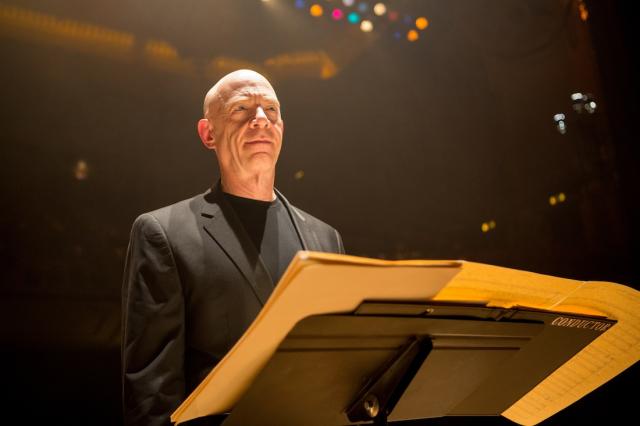Unorthodox, inspirational teachers on screen come in many shapes and sizes. There's the former marine who tosses candy bars at her underprivileged pupils to reward classroom participation (Michelle Pfeiffer, Dangerous Minds). There's the poetry prof who loosens up his posh boys by having them stand on their desks and carpe diem their senior year away (Robin Williams, Dead Poets Society). And then there's Terence Fletcher, a conductor at an elite music conservatory who'll hurl a chair at your face if you miss a beat, or dole out verbal abuse of the "if you sabotage my band, I'm going to fuck you like a pig" variety. Positive reinforcement, right?
If you're a high-achieving musical prodigy, chances are you've come across a guy as punishing as Whiplash's Fletcher (minus the pig fucking threats). For my part, I watched, recoiled in my seat, as the teacher went about outing his band's out-of-tune player like the Roman Catholic Church hunted down heretics. Whiplash is a cinematic anomaly: a film about a high school orchestra that plays out like Raging Bull, with a 19-year-old drummer (Miles Teller) destroying his blistered hands to master unusual time signatures.
Inspired by the nightmares and nausea director Damien Chazelle endured as a sax-playing prodigy, Whiplash is a blood-stained, adrenaline-dispensing meditation on the sacrifices one makes in the name of great art. Miles Teller is ferociously intense as a musician who never takes his eyes off the prize: reaching Charlie Parker levels of greatness, whatever the cost. There's this vacant look in his eyes, a spine-tingling lack of empathy and inability to relate to those who don't share his insane drive. As the petrifying bully who pushes pupils beyond what's expected (or legal?), J.K. Simmons is remarkably effective. Here are a few things we learned from the two leads at the Toronto International Film Festival.
1. On playing a guy with such ruthless ambition that the ‘psychopath' designation might be appropriate:
Miles Teller: “I was very much in Andrew's world. It was very simple: the guy just wants to be the greatest drummer that ever lived. It's nice to play a character who just has one goal in mind. I don't have all these other relationships. Just me with my drums.”
2. On thinking back to his own domineering, drill-sergeant teachers:
J.K. Simmons: A lot of musicians had a guy like [Fletcher] in their background. Miles equates it to a baseball coach he had. For me, it was a high school football coach. You look back on that time and go, ‘what a psycho! Why wouldn't he just…back off!'”
3. On whether there's something to be said for a teacher who won't hold back from saying: ‘Not good enough. Again.'
Miles Teller: “I was never the kind of kid who wanted to be coddled. I liked the coaches who were tough. When I was in theatre school, I had this one teacher who everyone thought was crazy and outrageous, but I saw the method to her madness. I don't think I would have gotten anywhere if I just had people telling me that whatever shit I did was good.”
4. On asking the director about the film's autobiographical nature, like practicing until his hands bled:
Miles Teller: “I kept asking [Damien], ‘is this believable?' Splattering blood on the snare and all this stuff, with our hands covered in it. I'd turn to him and ask, ‘is this shit believable?', and he'd say, ‘oh yeah!'”
5. On what he makes of Fletcher's comment that the two most harmful words in the English language are ‘good job':
J.K. Simmons: “In Fletcher's case, it's [motivated by a] true passion for the work – the music, the art, the greatness. Fletcher has a goal, whereas other directors you work with who are just screaming at people and being abusive, they're just assholes. If there's a goal of achieving greatness that you can recognize, at least you have a little understanding of why someone's going over the line.”
Whiplash
Closing film at Film Pop | Sunday, September 21st at 8 p.m. | Cinema J.A. de Seve
In theatres November 28 J.K. Simmons (Credit: Sony Picture Classics)
J.K. Simmons (Credit: Sony Picture Classics)